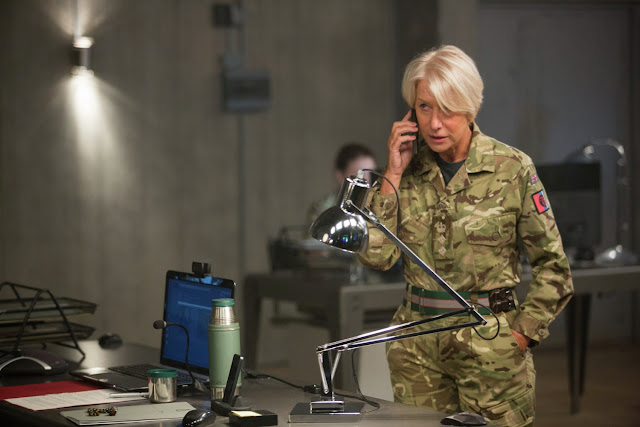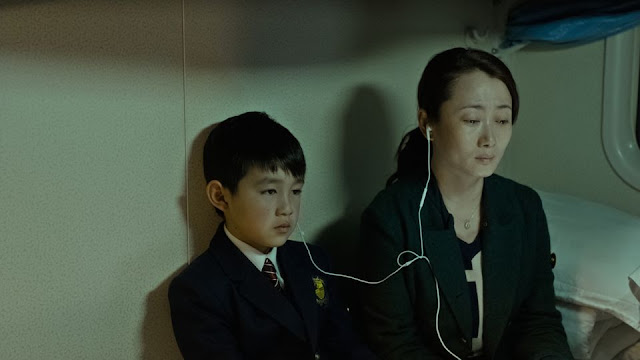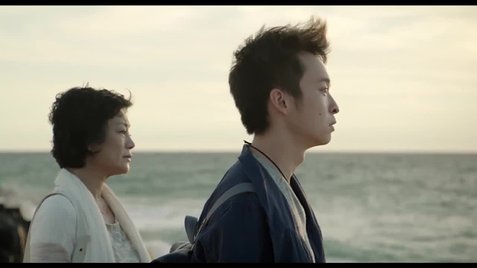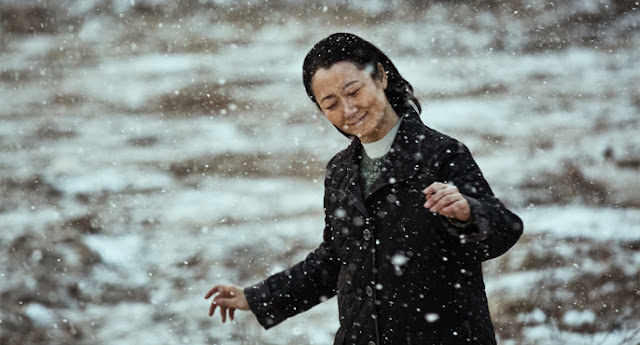A modern take on the 12 Angry Men concept but as a thriller, Eye In The Sky is a riveting exploration of group-think and morality in an era of depersonalized warfare where bureaucratic procedure and legal safeguards reveal there's still always someone that has to pull the trigger. Helen Mirren plays an English Colonel presented with an opportunity to take out several high profile most-wanted terrorists in East Africa. Her team consists of a joint task-force represented globally and coordinated through multiple forms of conference communication. Soldiers, technicians, and politicians are all connected via satellite from locations in England (Surrey & London), the US (Las Vegas, Hawaii, DC), Kenya, Singapore, China, etc. What starts out as a more simple mission of capturing a few terrorists based on solid intel becomes a more complicated decision of deploying a destructive payload from an unmanned aircraft towards multiple targets. The complication comes from one little girl selling bread in the street. Do they risk killing her or allow the potential killing of dozens from suicide bombers?
Overall I found Eye In The Sky to be a well-constructed demonstration of the choices facing those in power. Despite the shortcuts and possible fudging of numbers or of laws, I was impressed at the level of deliberation and thoughtfulness that went into a difficult decision like this. The situation is fraught with potential political, moral, and ultimately human consequences. The film does a great job of remaining an observer of the many viewpoints expressed for or against pulling the trigger and the subsequent collateral damage - one of many terms used as placeholder for the more terrible-sounding truth: possibly killing an innocent girl. There are no good choices.
The choices that must be made here by politicians and cabinet appointees are uniquely modern due to the progress of technology. The decision that would have been made by a soldier or officer in the field decades before is now being presented to, essentially, a committee. The existence of an omniscient eye guided by pilots half a world away allows real-time observation and analysis. The Kenyan intelligence team on the ground is just another resource available to Mirren's character and her team, always calculating percentages and probabilities that really represent actual human lives.
I was even more surprised to realize when the movie ended that Gavin Hood was the director (he also has a small part). After doing an A-for-effort job in directing the ultimately disappointing adaptation of Ender's Game I wouldn't have given him the credit of assuming he could deliver a film with such balance within ambiguity in Eye In The Sky, but I'm not as familiar with the rest of filmography.
The cast was convincing in presenting the many different points of view, most of them valid from one perspective or another. While Helen Mirren, Aaron Paul, and Barkhad Abdi (Captain Phillips) all do an excellent job, I noticed Alan Rickman most especially considering this was his final film role. They all have their part in this international coalition. Some characters see the choice before them as simple. Are they brave or foolhardy? Others see it as more difficult to make and are unsure. Are they morally cautious or cowardly? The film provides an excellent exploration of these questions and the result could be interpreted easily as making the case for any of the different viewpoints - and that is reflection of great skill in writing and directing.
Tuesday, November 1, 2016
Thursday, October 20, 2016
Mountains May Depart
Somewhere in Mountains May Depart there's a quote I can't recall that says, effectively, you can't spend your entire life with any one other person. While this may not be categorically true, if you think through the eras of a life - as a baby, toddler, childhood, teenager, young adult, middle-age, and so on - it is unlikely that any one person will be a part of your daily interactions throughout. Considering that, it can be true that the impact someone has on your life may be greater than the portion of time you spend with them. Through a handful of characters whose lives intertwine over three distinct periods of time - 1999, 2014, & 2025 - Chinese-born director Jia Zhangke explores and rejoices in the emotional resonance of our relationships in Mountains May Depart.
The three epochs of the film are each brilliantly conceived aesthetically to provide a subtle atmospheric guide to the scenes they are home to within the story. The boxy, more realistic and grainy style of the 1999 sequence - designed to match actual documentary footage the director and his cinematographer shot from the same period - is a little more raw, like the youthful emotions the characters experience in their mid-20's. Here we have a love triangle where our central character, Tao, is confronted with a choice between the brash, rich, and charming Jinsheng and the humble coal-miner Liangzi. The 2014 section is a wider aspect ratio with a higher quality, yet natural visual reflecting Tao's middle-aged experience. Life's lessons have provided a bit more perspective and the muted colors are like some of her dreams that haven't worked out as planned. She's divorced and facing a continental estrangement from her 7-year old son. A fully widescreen format with an artificial, over-developed HD quality evokes a 2025 that is equally more advanced and more separated from the past. This is the backdrop as Tao's son Dollar has to learn why he feels unsettled in a life he's done little to create for himself. Here, in a bit of an Oedipal twist, he develops a relationship with a surrogate mother of sorts that reminds the youth, now so far removed from his past that he can't even speak his first language, where he came from. For the first time of his own volition he makes the choice to search and reach backwards so that he can progress and grow. It hurts. You don't know if he achieves what he's reaching for but the important thing is that he chooses to do it.
Zhangke uses artifacts from his own life, from pop-culture, and of a more universal nature to serve as totems for emotional relationships that bridge the difference timelines. In 1999 Tao is young and bright, greeting each moment with a smile. She rejoices in music and food that bring her joy. Later in 2014 she faces losing everyone that is or has been important to her and these things become tools for holding on to what she's lost. A divorce left her with lots of money and a lost custody battle for her young son, whose father is abandoning all remnants of their culture and taking him to Australia. After panicking, Tao resolves to make the most impact she can on the impressionable and hungry heart of her little boy. She prepares several tokens for him to keep close through taste, touch, sound and feeling, as they will become further away than ever. The keys she gives Dollar are based on the director's own mother doing the same for him. It's possible she may never know the impact they have in his life but they become figuratively the keys to his unlocking his own freedom (see what I did there??) as he comes of age in 2025. These tokens used throughout the film, and especially two key pieces of music and the light-touch score from Yoshihiro Hanno, immediately have the same effect on the viewer each time they are re-introduced to signify a key relationship and emotion whose origin may be otherwise untraceable to the characters.
While I understand the Chinese title refers to a well-known proverb, the English title Mountains May Depart is biblical:
Love of many types is shared between several characters throughout the film and can have a lasting effect. Take the character of Liangzi. Although he presents the purer, more caring and loyal offer of love to Tao in their youth, she chooses the wealth and charm of Jinsheng. We meet him again in middle-age with a young family and the type of health that come from a life in a coal-mine and Tao sees and reflects on what her life might have been had she made the other choice. That unrealized love he had for her helps drive her pure love for her son Dollar. It is that seed she plants that then helps Dollar overcome the stifling circumstances his father has created for him, helped to grow through the spark of his teacher, Mia.
Ending with a note on more to think about on a second viewing, the movie has much to say on the evolution of Chinese culture through the years that can be universally applied to how culture changes over time. An entire class of children of Chinese expats in 2025 Australia is dedicated to attempting to teach in a classroom what their parents didn't pass on naturally. Zhangke comments on labor & economy, class warfare, the isolation of technology, an increasingly complex global world, and just the sheer scale of his homeland. Despite all these shifts through several decades, there is resilience in the foundation of the human relationships. Plus there the whole thing is book-ended by some great dancing that serves as a signal tot he filmmakers hopefulness and is also just kinda fun.
The three epochs of the film are each brilliantly conceived aesthetically to provide a subtle atmospheric guide to the scenes they are home to within the story. The boxy, more realistic and grainy style of the 1999 sequence - designed to match actual documentary footage the director and his cinematographer shot from the same period - is a little more raw, like the youthful emotions the characters experience in their mid-20's. Here we have a love triangle where our central character, Tao, is confronted with a choice between the brash, rich, and charming Jinsheng and the humble coal-miner Liangzi. The 2014 section is a wider aspect ratio with a higher quality, yet natural visual reflecting Tao's middle-aged experience. Life's lessons have provided a bit more perspective and the muted colors are like some of her dreams that haven't worked out as planned. She's divorced and facing a continental estrangement from her 7-year old son. A fully widescreen format with an artificial, over-developed HD quality evokes a 2025 that is equally more advanced and more separated from the past. This is the backdrop as Tao's son Dollar has to learn why he feels unsettled in a life he's done little to create for himself. Here, in a bit of an Oedipal twist, he develops a relationship with a surrogate mother of sorts that reminds the youth, now so far removed from his past that he can't even speak his first language, where he came from. For the first time of his own volition he makes the choice to search and reach backwards so that he can progress and grow. It hurts. You don't know if he achieves what he's reaching for but the important thing is that he chooses to do it.
Zhangke uses artifacts from his own life, from pop-culture, and of a more universal nature to serve as totems for emotional relationships that bridge the difference timelines. In 1999 Tao is young and bright, greeting each moment with a smile. She rejoices in music and food that bring her joy. Later in 2014 she faces losing everyone that is or has been important to her and these things become tools for holding on to what she's lost. A divorce left her with lots of money and a lost custody battle for her young son, whose father is abandoning all remnants of their culture and taking him to Australia. After panicking, Tao resolves to make the most impact she can on the impressionable and hungry heart of her little boy. She prepares several tokens for him to keep close through taste, touch, sound and feeling, as they will become further away than ever. The keys she gives Dollar are based on the director's own mother doing the same for him. It's possible she may never know the impact they have in his life but they become figuratively the keys to his unlocking his own freedom (see what I did there??) as he comes of age in 2025. These tokens used throughout the film, and especially two key pieces of music and the light-touch score from Yoshihiro Hanno, immediately have the same effect on the viewer each time they are re-introduced to signify a key relationship and emotion whose origin may be otherwise untraceable to the characters.
While I understand the Chinese title refers to a well-known proverb, the English title Mountains May Depart is biblical:
"For the mountains may depart and the hills be removed, but my steadfast love shall not depart from you" -Isaiah 54:10 ESV
Ending with a note on more to think about on a second viewing, the movie has much to say on the evolution of Chinese culture through the years that can be universally applied to how culture changes over time. An entire class of children of Chinese expats in 2025 Australia is dedicated to attempting to teach in a classroom what their parents didn't pass on naturally. Zhangke comments on labor & economy, class warfare, the isolation of technology, an increasingly complex global world, and just the sheer scale of his homeland. Despite all these shifts through several decades, there is resilience in the foundation of the human relationships. Plus there the whole thing is book-ended by some great dancing that serves as a signal tot he filmmakers hopefulness and is also just kinda fun.
Tuesday, March 1, 2016
Book: The Fault In Our Stars - John Green
I had really no expectations going into this book - I didn't know it was a teen book until I downloaded it. I had noticed recommendations from a diverse range of people and the title was intriguing (I had no idea of the original reference). I had been reading some heavier, dense, and less accessible books before this so it was a refreshing change of pace. To clarify, the book deals with heavy topics (i.e. death & cancer) but it's a breeze to get through.
I was drawn into the characters really quickly and really enjoyed all the kids' distinct personalities. The love story between the two main characters is really well done in that it mostly develops slowly and deeply and is a lot of fun to watch happen. And I love the quick-witted dialogue - although I don't know enough teenagers to know if there really are kids that are this brilliant, witty, and mature (I sure wasn't). Because, despite the situation they're in, they are pretty well-balanced people - despite constantly thinking of death, suffering, and pain. The interaction between Hazel and Gus is really the best part of the book. There are just a couple of minor criticisms that I'll mention in the spoiler section, but overall the dynamic dialogue between the characters what makes it a really engaging book. Oh, and also, having living in Indianapolis myself for 2 years, I really loved knowing everything he was talking about geographically in Indy.
Spoiler Section:
So the only part I didn't like about the love story is that Hazel and Augustus have sex in Amsterdam. Poetically and structurally, especially from the viewpoint of the end of the book, it makes sense and they are teenagers with hormones and libidos, etc. etc., but I thought it didn't quite fit with the characters themselves - like the part in movies where the two main characters all of a sudden just start kissing without explanation. I thought that Hazel wouldn't have gone for that. I never think teenagers having sex is ok - and I realize that the author is probably trying to be "realistic" but it didn't fit for me here. I also kind of thought that things dragged on a bit after Gus dies. Perhaps Mr. Green does not want to let happen to his characters what happened to the characters from An Imperial Affliction. And maybe its just cause I liked Gus's characters so much that I just missed him, but I felt less engaged at that point. And the very ending (letter from Gus to Peter van Houten) is nice and all, but the little explanation for Gus writing to van Houten and not Hazel (namely that he doesn't think he's a good writer) makes no sense and seems to be just a mechanism to keep some suspense and have that final moment come at the time the author wants it. That lessened it's impact for me.
I was drawn into the characters really quickly and really enjoyed all the kids' distinct personalities. The love story between the two main characters is really well done in that it mostly develops slowly and deeply and is a lot of fun to watch happen. And I love the quick-witted dialogue - although I don't know enough teenagers to know if there really are kids that are this brilliant, witty, and mature (I sure wasn't). Because, despite the situation they're in, they are pretty well-balanced people - despite constantly thinking of death, suffering, and pain. The interaction between Hazel and Gus is really the best part of the book. There are just a couple of minor criticisms that I'll mention in the spoiler section, but overall the dynamic dialogue between the characters what makes it a really engaging book. Oh, and also, having living in Indianapolis myself for 2 years, I really loved knowing everything he was talking about geographically in Indy.
Spoiler Section:
So the only part I didn't like about the love story is that Hazel and Augustus have sex in Amsterdam. Poetically and structurally, especially from the viewpoint of the end of the book, it makes sense and they are teenagers with hormones and libidos, etc. etc., but I thought it didn't quite fit with the characters themselves - like the part in movies where the two main characters all of a sudden just start kissing without explanation. I thought that Hazel wouldn't have gone for that. I never think teenagers having sex is ok - and I realize that the author is probably trying to be "realistic" but it didn't fit for me here. I also kind of thought that things dragged on a bit after Gus dies. Perhaps Mr. Green does not want to let happen to his characters what happened to the characters from An Imperial Affliction. And maybe its just cause I liked Gus's characters so much that I just missed him, but I felt less engaged at that point. And the very ending (letter from Gus to Peter van Houten) is nice and all, but the little explanation for Gus writing to van Houten and not Hazel (namely that he doesn't think he's a good writer) makes no sense and seems to be just a mechanism to keep some suspense and have that final moment come at the time the author wants it. That lessened it's impact for me.
Subscribe to:
Posts (Atom)









